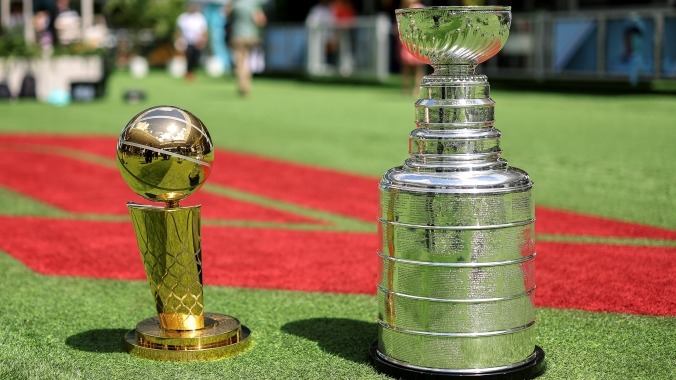Basketball
Fun Fact: Basketball, Hockey and Soccer Are All the Same Sport

You may laugh at this title as some desperate attempt to string three topical events together before we descend into the summer sports doldrums of endless baseball, but by the end of this blog you will have no choice but to agree with the manifestly true conclusion made by my highly evolved sports mind. Some may call this birdbrained hot take engagement bait, but the truth is that I have watched enough hours of each sport to see the truth, and everyone else who disagrees simply is not as smart as me. I feel bad for you, really.
“But Jacob, one sport is played with your hands, another your hands are prohibited, and the third you play with a weird stick” some of you may be babbling incoherently. You rubes. You absolute fools. This is the definition of missing the forest for the trees. Open up your third eye and look deeper into the very essence of each sport, and you will experience an epiphany leading you to the same empirically correct position that I have reached.
Let’s drop the shtick a little and be serious: basketball, hockey and soccer are all inarguably the same sport from a basic philosophical perspective. A team joins together to put an object in a goal while the other team tries to stop them. The playing surfaces and specifics of the rules differ, but the fundamental dynamic remains the same, and this produces remarkably similar tactics and strategies across all three sports.
All three use the same base defensive tactics as an organizing principle. Basketball transitioning from an era of two bigs and three wings to a one-in-four-out style changes this dynamic a bit, but the basic principle of sticking two big mean folks next to the goal to stop the other team from scoring remains the same. Most soccer formations contain two center backs, hockey is situated around two defensemen guarding the net and freeing up the three forwards to attack, while the Minnesota Timberwolves proved this year that the best NBA defense is still one where you stick your two biggest dudes next to the rim.
Offensively there is far more variation, as the specifics of each sport influence tactics, but the basic formation of attack remains similar too. Whether it’s the famed Spanish Tiqui-taca style or the Edmonton Oilers’ unstoppable power play or Phil Jackson’s Triangle Offense, a formation where the ball/puck handler has two direct outlets on each side of them is a very common and effective tactic across all three sports.
“OK fine Jacob, you make some valid points, but the same sport? Come on.”
Again, I cannot help but pity you small-brained sports fans who let old-world materialism blind you to the shared spirit across these beautiful games. Every time Splinter’s official athlete Nikola Jokic finds an open man cutting to the net, Lionel Messi smiles. Whenever rightful Conn Smythe Trophy winner Connor McDavid befuddles yet another defender to put another point on the board, Steph Curry can’t help but reach out through the ether to fist bump him in solidarity.
At their most granular level, all team sports share the same dynamic which is generally focused on creating space in effective manners. The play-action play in football is the most vivid image of this principle, as the fake handoff to the running back is designed to pull linebackers and safeties closer to the line of scrimmage in order to create space for a receiver to run into the vacated spot behind them. The triangle as a basic organizing offensive principle across basketball, hockey and soccer just reinforces its role as a foundational aspect of engineering, and it also attempts to accomplish the same goal as the play-action pass of moving the defense out of a space the offense wants to move into.
Sports are a universal language. Soccer has spread throughout the world both because of colonialism and its simple rules and low cost to play, and basketball is following suit as it establishes itself as a true global game in the American century. Hockey’s equipment will always make it more prohibitively expensive and thus less likely to take over the world in the vein of soccer, but the fact that it has still spread to practically every corner of the globe proves it adheres to the same universal principles that make basketball and soccer so popular.
So to conclude, I accept your apology dear reader. I know that this title just looks engineered to troll you, but the logic presented is so obviously true I can only assume that every single person who is reading this wholeheartedly agrees with me now. Soccer, basketball and hockey are the same sport and everyone who thinks otherwise just needs to open their third eye.


)






